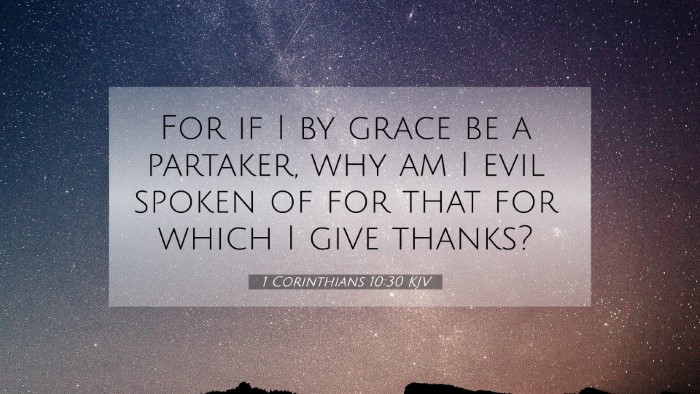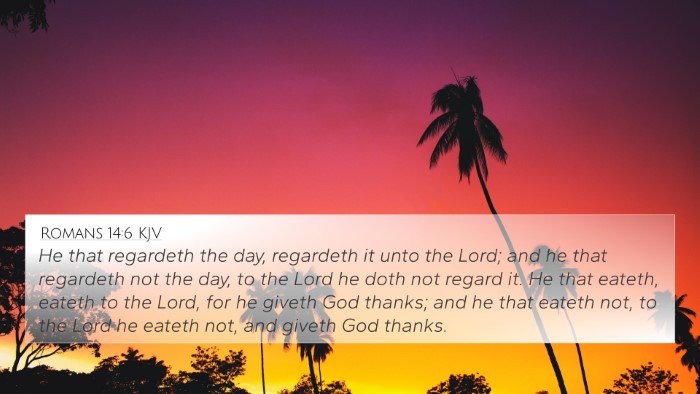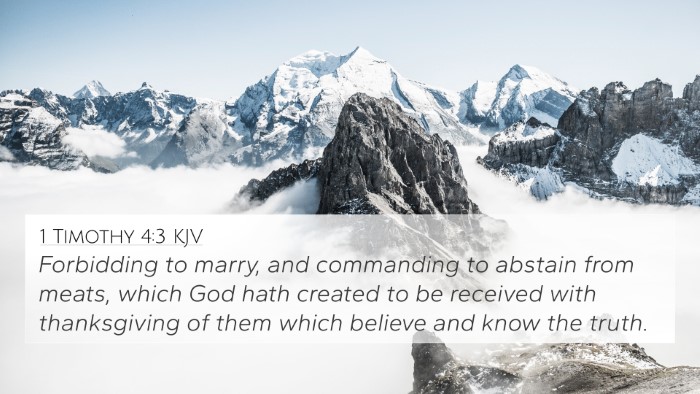Understanding 1 Corinthians 10:30
Verse: "For if I by grace be a partaker, why am I evil spoken of for that for which I give thanks?"
Summary of the Verse
This verse reflects an important principle in Christian conduct regarding the use and enjoyment of liberty in Christ. Paul addresses the issue of eating food offered to idols and how it may affect the conscience of others. The grace received through faith liberates a believer but also calls for responsible action that promotes the welfare of others.
Commentary Insights
- Matthew Henry's Commentary: Henry emphasizes the importance of giving thanks for God's provisions and the grace we enjoy. He notes that the believer should be mindful of their actions and how they might cause others to stumble in faith. Gratitude should govern a Christian's attitude.
- Albert Barnes' Commentary: Barnes points out that if one is a participant in God’s grace, they should not receive undue criticism for their actions if they are righteous and thankworthy. He highlights the inconsistency of being criticized for doing what one believes is good and can bring glory to God.
- Adam Clarke's Commentary: Clarke elaborates on the context of the verse, indicating that Paul battles the criticism of those who misunderstood the Christian freedom to partake in food that others deemed unholy. He affirms that believers should act based on thankfulness and integrity rather than fear of human judgment.
Applying the Verse
This verse teaches that Christian liberty should be exercised with a sense of responsibility. Believers are encouraged to live in a manner consistent with their faith, always seeking to build up rather than tear down the faith of others.
Cross-References
- Romans 14:6: "He who observes the day, observes it for the Lord; and he who eats, eats for the Lord, for he gives God thanks..." This verse underscores the importance of intentionality and thankfulness in Christian actions.
- 1 Timothy 4:4-5: "For every creature of God is good, and nothing is to be refused if it is received with thanksgiving..." This reinforces the notion of receiving food and drink in gratitude, highlighting God's provision.
- Colossians 3:17: "And whatever you do in word or deed, do all in the name of the Lord Jesus, giving thanks to God the Father through Him." It connects the believer's actions to the overarching principle of thankfulness.
- 1 Corinthians 8:8: "But food does not commend us to God; for neither if we eat are we the better, nor if we do not eat are we the worse." This brings perspective to the actions of eating and drinking in relation to one’s faith.
- Philippians 4:6: "Be anxious for nothing, but in everything by prayer and supplication, with thanksgiving, let your requests be made known to God." This emphasizes thankfulness in all situations, enhancing the believer's reliance on God.
- Galatians 5:13: "For you, brethren, have been called to liberty; only do not use liberty as an opportunity for the flesh, but through love serve one another." This ties into the ethical implications of what one does with their freedom.
- 2 Corinthians 9:11: "While you are enriched in everything for all liberality, which causes thanksgiving through us to God." It underlines the connection between God’s blessings and the expression of gratitude.
- Matthew 15:11: "Not what goes into the mouth defiles a man, but what comes out of the mouth, this defiles a man." This verse addresses the external actions versus internal motivations, encouraging a focus on righteousness over ritual.
- 1 Thessalonians 5:18: "In everything give thanks; for this is the will of God in Christ Jesus for you." This foundational command reinforces the critical role of gratitude in a believer's life.
Practical Application
Incorporating the insights from 1 Corinthians 10:30 can lead Christians to a more thoughtful engagement with their faith. Here are some practical applications:
- Reflect on Intent: Before participating in activities such as eating certain foods or engaging in cultural practices, reflect on whether these actions glorify God and promote gratitude.
- Be Mindful of Others: Consider how your actions may impact others' beliefs and practices, and strive to act in ways that encourage faith and unity among believers.
- Embrace Grace: Recognize the grace of God in your life as a foundation for your interactions, allowing it to inform your choices and responses to criticism.
- Practice Gratitude: Cultivate an attitude of thankfulness in every aspect of life, ensuring that all you do is underpinned by a recognition of God's blessings.
Conclusion
1 Corinthians 10:30 teaches critical lessons regarding Christian liberty, gratitude, and the responsibilities that come with grace. Through the insights of esteemed biblical scholars and careful consideration of related scripture, believers can explore deeper thematic connections and apply these teachings to foster a more intentional faith journey.




